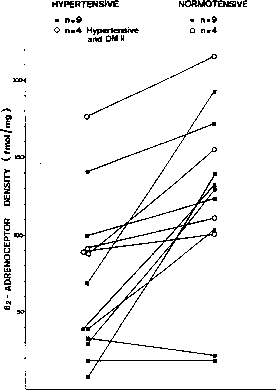Receptor:
Up: Introduction Previous: Functionality
It appears from epidemiological surveys that hypertension is rare in
populations with a
traditionally low salt intake[35]. However, if a high salt intake
plays a role in human
hypertension, great inter-individual variability must exist in susceptibility
to salt. The term salt sensitivity was introduced for the phenomenon
of substantial blood pressure rise ( ![]() 3 mmHg) under a high salt diet.
In a previous study, the daily salt intake in normotensive medical students
[36, 37, 38, 39, 40, 41, 42] was altered from
200 mmol Na
3 mmHg) under a high salt diet.
In a previous study, the daily salt intake in normotensive medical students
[36, 37, 38, 39, 40, 41, 42] was altered from
200 mmol Na ![]() /day to 50 mmol/day and back to 200 mmol/day.
A decrease in blood pressure following dietary salt reduction predominantly in
individuals with a positive family history of hypertension was observed.
Figure fig:diet
shows the distribution of the change in blood pressure of those with positive
and negative family histories respectively.
These findings suggest that those individuals with a positive history of
hypertension are more likely to be salt sensitive, a conclusion which is also
consistent with the observation that hypertensive patients, as a group, are
more likely to be salt sensitive than normotensive persons [43].
A high salt diet over two weeks was accompanied by an up-regulation of
/day to 50 mmol/day and back to 200 mmol/day.
A decrease in blood pressure following dietary salt reduction predominantly in
individuals with a positive family history of hypertension was observed.
Figure fig:diet
shows the distribution of the change in blood pressure of those with positive
and negative family histories respectively.
These findings suggest that those individuals with a positive history of
hypertension are more likely to be salt sensitive, a conclusion which is also
consistent with the observation that hypertensive patients, as a group, are
more likely to be salt sensitive than normotensive persons [43].
A high salt diet over two weeks was accompanied by an up-regulation of
![]() and a down-regulation of
and a down-regulation of ![]() adrenergic receptors, resulting
in a rise of the
adrenergic receptors, resulting
in a rise of the ![]() /
/ ![]() adrenoceptor ratio.
Such a response would favour enhanced
adrenoceptor ratio.
Such a response would favour enhanced ![]() mediated vasoconstriction
[44], and reduced
mediated vasoconstriction
[44], and reduced ![]() mediated vasodilation during a high salt
intake [45] (see figure fig:niere). Neither changes in
mediated vasodilation during a high salt
intake [45] (see figure fig:niere). Neither changes in
![]() nor in
nor in ![]() are alone predicted blood pressure responses to a
high salt diet. Since
are alone predicted blood pressure responses to a
high salt diet. Since ![]() and
and ![]() adrenoceptors mediate not only
opposing effects on resistance vessels, but also may mediate opposing effects
on renal sodium handling[46, 47, 48], the concept of
the
adrenoceptors mediate not only
opposing effects on resistance vessels, but also may mediate opposing effects
on renal sodium handling[46, 47, 48], the concept of
the ![]() and
and ![]() receptors (operative adrenoceptor ratio) was put forward.
receptors (operative adrenoceptor ratio) was put forward.
The increase in ![]() adrenergic receptor ratio
by high salt intake may trigger a cascade
of intracellular
events such as a decrease of intracellular cyclic AMP and an
increase in cytosolic calcium[49]. Both events increase potassium conductance of
cell membranes[50], thereby
activating the sodium pump[51]. Evidence for these events has been
obtained in hypertensive subjects [7, 38, 52, 53].
adrenergic receptor ratio
by high salt intake may trigger a cascade
of intracellular
events such as a decrease of intracellular cyclic AMP and an
increase in cytosolic calcium[49]. Both events increase potassium conductance of
cell membranes[50], thereby
activating the sodium pump[51]. Evidence for these events has been
obtained in hypertensive subjects [7, 38, 52, 53].
In order to avoid possible influences of the milieu interieur on adrenoceptor regulation in vivo, studies on cultured fibroblasts were performed.
Furthermore, in a subsequent study[18], ![]() receptors were
measured in cultured
fibroblasts obtained from hypertensive subjects and matched
receptors were
measured in cultured
fibroblasts obtained from hypertensive subjects and matched![]() controls. The age of the
subjects (42 - 53 years) was chosen to reduce the chance for controls to
develop hypertension and to make it unlikely that the hypertensive patients
have
hypertension related to atherosclerosis. As shown in figure fig:hyper, hypertensive
individuals show a distinct reduction of
controls. The age of the
subjects (42 - 53 years) was chosen to reduce the chance for controls to
develop hypertension and to make it unlikely that the hypertensive patients
have
hypertension related to atherosclerosis. As shown in figure fig:hyper, hypertensive
individuals show a distinct reduction of ![]() -receptors. These findings
favour the hypothesis that salt sensitivity is a precursor of
hypertension, in a significant proportion of
hypertensives.
As displayed in table tab:ss, hypertensive subjects express a lower
number of
-receptors. These findings
favour the hypothesis that salt sensitivity is a precursor of
hypertension, in a significant proportion of
hypertensives.
As displayed in table tab:ss, hypertensive subjects express a lower
number of ![]() receptors as compared to normotensives. This evidence suggests that a possible
genetic factor of essential hypertension is a disturbed regulation of the
2ar.
receptors as compared to normotensives. This evidence suggests that a possible
genetic factor of essential hypertension is a disturbed regulation of the
2ar.

Table 1.5: ![]() adrenoceptor downregulation in hypertensive subjects
adrenoceptor downregulation in hypertensive subjects

Figure 1.4: ![]() adrenoceptor densities of matched individuals
adrenoceptor densities of matched individuals
Receptor:
Up: Introduction Previous: Functionality Alexander Binder